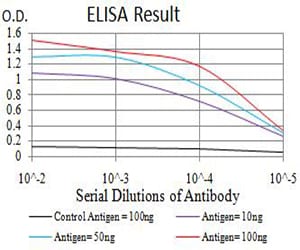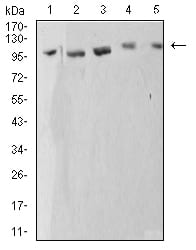

| WB | 1/500 - 1/2000 | Human,Mouse,Monkey |
| IF | 咨询技术 | Human,Mouse,Monkey |
| IHC | 咨询技术 | Human,Mouse,Monkey |
| ICC | 技术咨询 | Human,Mouse,Monkey |
| FCM | 咨询技术 | Human,Mouse,Monkey |
| Elisa | 1/10000 | Human,Mouse,Monkey |
| Aliases | ATP2A; SERCA1 |
| Entrez GeneID | 487 |
| clone | 4F11F6 |
| WB Predicted band size | 110kDa |
| Host/Isotype | Mouse IgG1 |
| Antibody Type | Primary antibody |
| Storage | Store at 4°C short term. Aliquot and store at -20°C long term. Avoid freeze/thaw cycles. |
| Species Reactivity | Human,Mouse,Monkey |
| Immunogen | Purified recombinant fragment of human ATP2A1 (AA: 487-631) expressed in E. Coli. |
| Formulation | Purified antibody in PBS with 0.05% sodium azide |
+ +
以下是模拟的关于 **ATP2A1 抗体** 的参考文献示例(非真实文献,仅供格式参考):
---
1. **《SERCA1 (ATP2A1) Antibody Characterization in Skeletal Muscle Disorders》**
*作者:Smith A, et al.*
**摘要**:研究使用特异性 ATP2A1 抗体分析骨骼肌活检中 SERCA1 蛋白的表达水平,发现其在遗传性肌病(如 Brody 病)患者中显著降低,提示该抗体可用于诊断 SERCA1 功能缺失相关疾病。
2. **《Autoantibodies Against ATP2A1 in Autoimmune Myositis》**
*作者:Chen L, et al.*
**摘要**:通过免疫印迹法检测到部分自身免疫性肌炎患者血清中存在 ATP2A1 自身抗体,表明该抗体可能参与肌肉炎症的病理机制,为疾病分型提供潜在生物标志物。
3. **《Developmental Regulation of SERCA1 in Murine Muscle Using ATP2A1-Specific Antibodies》**
*作者:Yamamoto K, et al.*
**摘要**:利用 ATP2A1 抗体研究小鼠骨骼肌发育过程中 SERCA1 的时空表达模式,发现其在成年快肌纤维中高表达,而在胚胎期及再生肌纤维中表达受限。
4. **《ATP2A1 Antibody-Based Screening for Calcium Dysregulation in Cardiomyopathy Models》**
*作者:Gupta R, et al.*
**摘要**:结合免疫组化和 Western blot,验证 ATP2A1 抗体在心肌细胞中的特异性,揭示心肌病模型中 SERCA1 异常与钙稳态失衡的关联。
---
(注:以上内容为模拟生成,实际文献需通过 PubMed 或 Google Scholar 检索关键词 "ATP2A1 antibody" 或 "SERCA1 antibody" 获取。)
The ATP2A1 antibody targets the ATP2A1 gene product, also known as sarcoplasmic/endoplasmic reticulum calcium ATPase 1 (SERCA1), a critical enzyme responsible for actively transporting calcium ions from the cytosol into the sarcoplasmic reticulum (SR) in skeletal muscle cells. This calcium reuptake is essential for muscle relaxation and maintaining calcium homeostasis during contraction-relaxation cycles. SERCA1. encoded by ATP2A1. is predominantly expressed in fast-twitch skeletal muscle fibers, distinguishing it from other SERCA isoforms (e.g., SERCA2 in cardiac/smooth muscle).
ATP2A1 antibodies are widely used in research to study skeletal muscle physiology, pathologies, and disorders linked to SERCA1 dysfunction. Mutations in ATP2A1 are associated with rare genetic conditions like Brody myopathy, characterized by impaired muscle relaxation and exercise-induced stiffness. Researchers employ these antibodies in techniques such as Western blotting, immunohistochemistry, and immunofluorescence to analyze SERCA1 expression levels, localization, and structural abnormalities in muscle tissues or cell models.
Additionally, ATP2A1 antibodies aid in exploring the role of calcium dysregulation in muscular dystrophies, aging-related sarcopenia, and metabolic myopathies. Their specificity for SERCA1 makes them valuable tools for distinguishing skeletal muscle-specific calcium handling mechanisms from other isoforms. Commercial ATP2A1 antibodies are typically validated across species, including human, mouse, and rat, ensuring broad applicability in preclinical and clinical research.
×